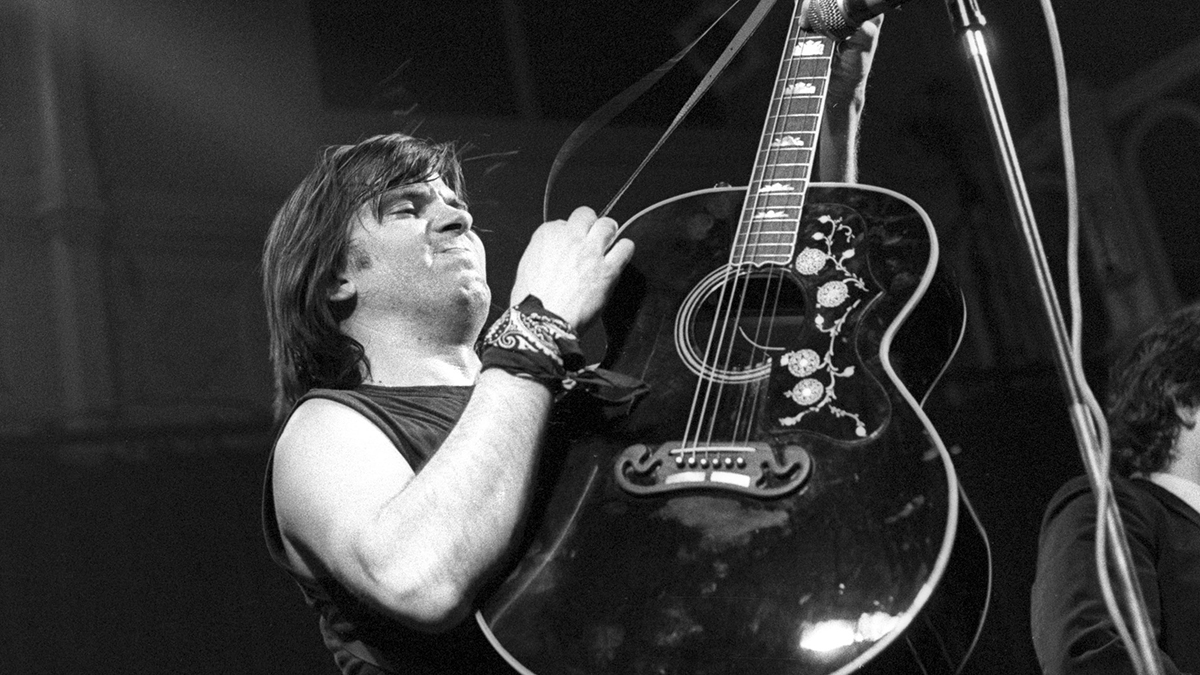"People at my own record label had decided that my career was not going to survive.” Steve Earle wrote a timeless tale of outlaws in America. It became a hit. Then Tennessee made it the state song
The al-country firebrand says he was just trying to build an audience for himself on rock radio when he wrote "Copperhead Road" in 1988

With its tale of moonshine and pot farming, Steve Earle’s “Copperhead Road” embraces outlaw themes that span generations of American history. The irony isn’t that the 1988 song was a top 10 hit — it’s that Tennessee adopted it as the state song even while pot remains illegal there. (Moonshine is legal with a license.) The state legislature even invited Earle to perform “Copperhead Road” before the General Assembly at the Tennessee State House in 2023, when it was officially declared the state’s new song.
Featuring a simple chordal structure and a Celtic rock–tinged arrangement of guitars and mandolin, “Copperhead Road” has clearly stood the test of time. It’s a source of amazement for Earle, who explains that it was the first thing he ever wrote on mandolin.
“And I didn't really play mandolin,” he admits. “I only knew those two chords, and that was it. I was always fascinated with the instrument so I got a hold of one and started messing around with it. Once I had the music, I wrote the lyrics based on a story that I’d read in the newspaper some 12 years prior about an older woman in her 70s that had gotten arrested in Elizabeth, North Carolina with this big marijuana patch in this holler.”

Combining elements from country, rock and Celtic music, “Copperhead Road” underscores the cultural landscape at the song’s core, further highlighted by the stirring faux bagpipes. “It isn't an actual bagpipe but a synth patch that my keyboard player, Ken Moore, built from scratch,” Earle explains. “And because I associated mandolin with bluegrass and Appalachian music, it just made sense.
“The idea was that most of that music, and that part of the country, originally comes from Scotland and Ireland anyway. So I was trying to paint a picture of this place in the middle of nowhere in the mountains. And opening with that bagpipe riff, I think really does that.”
Earle’s career had arrived at a crossroad at the time he recorded “Copperhead Road.” He had already released two country-oriented albums when he decided to merge his bluegrass and heavy rock influences. To that end, “Copperhead Road” was aimed squarely at building a new audience for himself.
“I just was trying to get on rock radio while still staying true to who I was,” he says. “I didn’t think rock radio was any better than country radio, but there were people at my own record label who had decided that my career was not going to survive, due to the fact that my previous album, Exit O, hadn’t done anything on the country charts. It got lots of rock press and got played on a few rock stations for the first time, but that was it. So I decided I was going to make a rock and roll record on purpose.”
All the latest guitar news, interviews, lessons, reviews, deals and more, direct to your inbox!
During the recording sessions, held at Ardent Studios in Memphis, Earle stuck to playing the mandolin, leaving the guitar work to his two guitarists in his band, though he did overdub a second acoustic guitar tuned to Drop D. “For the overdub, I used a Gibson Montana J-100 that I had,” he recalls. “It’s the same one that's on the cover of my debut album, Guitar Town.
“Donny Roberts played the electric guitar. I can’t recall now what the exact tuning was, except that it was tuned to some sort of D tuning. And Bill Lloyd played the main acoustic guitar on the track, a Takamine EG341C. There weren’t many takes done of the song in the studio, as we had already rehearsed it, so we didn't have any trouble recording it.”
Reaching number 10 on the Billboard Mainstream Rock chart in 1988, “Copperhead Road” not only garnered Earle mainstream popularity and saved his career — it also became a mainstay of line dancing. “It's one of the only dances to have survived the line dancing craze,” Earle asserts. “It happens every night and with every nightclub that plays country records for people to dance to. I grew up where the line dance thing started, before they became all of these different line dances — like a line dance for ‘Achy Breaky Heart,’ a line dance for ‘Copperhead Road.’ A lot of people have covered it too, over the years, so, I'm flattered by that.”
As for “Copperhead Road” becoming Tennessee’s state song, Earle appreciates the recognition but questions whether any lawmakers who supported the accolade have actually listened to it.
“It’s one of those things: I figure that I’ll retain the honor until somebody actually goes onto a website and reads the lyrics,” Earle says. “I went to the legislature and played ‘Copperhead Road’ on the legislature floor. There had been a really bad school shooting in Nashville right before that, and it had become a big political issue.
“And because the guys that sort of sponsored that bill were guys that think more like me, they were really outspoken when all that was going on. And so, at the end of my performance, I reminded them all that they ought to give a listen to my other song from that same record about gun violence: ‘Devil's Right Hand.’”
Joe Matera is an Italian-Australian guitarist and music journalist who has spent the past two decades interviewing a who's who of the rock and metal world and written for Guitar World, Total Guitar, Rolling Stone, Goldmine, Sound On Sound, Classic Rock, Metal Hammer and many others. He is also a recording and performing musician and solo artist who has toured Europe on a regular basis and released several well-received albums including instrumental guitar rock outings through various European labels. Roxy Music's Phil Manzanera has called him "a great guitarist who knows what an electric guitar should sound like and plays a fluid pleasing style of rock." He's the author of two books, Backstage Pass; The Grit and the Glamour and Louder Than Words: Beyond the Backstage Pass.


